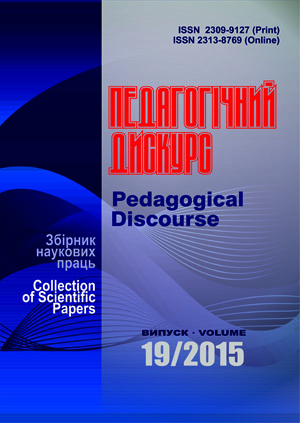Formation of Cognitive Independency of Foreign Language Future Teachers in the Process of Major Courses Learning
Abstract
The article deals with the problem of training future foreign language teachers and developing their cognitive confidence by means of professional subjects. Additionally, educational and cognitive activities of future foreign language teachers by means of professional subjects implies independent individual learning tasks and problem-solving situations which fosters creative thinking in close relationship with the problem, gaming, interactive learning techniques. Thus, a prerequisite must be met before developing special, educational and cognitive skills as well as creative thinking. In other words, classroom classes and extracurricular activities should prevail and become a part of independent research of future teachers. Concurrently, methodology should include a research method, individual and tiered assignments while using practical works, discussions, debates, dialogic and playing methods. Also, independent work is characterized by authentic and practical strategy. The keys to instructional effectiveness of this approach are: individual learning assignments should be engaging and stimulating for students; independent learning tasks should be distinctively grouped according to the cognitive abilities of students; independent work should be structured. It may start with the algorithm at the studentsʼ reproductive level and proceed to the structured scientific research at the productive and creative stage; there should be strong and solid knowledge towards ways of performing independent work; one of its features can be found in positive results of University teachers concerning students independent activity (forms of reporting, workload, deadline, etc.); consultations depends upon the level of cognitive studentsʼ independence (consultations – entrance, thematic, problem, heuristic, etc.); it can be characterized by clear rubrics for independent work of students; independent work of students consisits of different types and forms of its public monitoring; there can be found different types and levels of self-control tests for students.
Downloads
References
Goncharenko S. U. Ukrainskyi pedagogichnyi slovnyk (Ukrainian pedagogical dictionary), K., 1997, 376 p. [in Ukrainian]
Dal V. Tolkovyi slovar zhyvogo velikoruskogo yazyka (Explenatory dictionary of living Russian), M., 1991, Vol. 4, p. 135. [in Rusian]
Danilov M. A. Ob usloviyah razvitiya poznavatelnoi samostoyatelnosti i akyivnosti u uchashchihsya na urokah (About conditions of development of cognitive independency and activity of pupils on the lessons), Kazan, 1963, 96 p. [in Rusian]
Encyklopedia osvity (Educational encyclopaedia), K., 2008, 1040 p. [in Ukrainian]
Kovaleva G. E. Organizaciya samostoyatelnoi raboty studentov na osnove deyatelnostnoi teorii ucheniya (Independent activity organization of students on the bases of active learning theory), SPb., 1995, p. 3. [in Rusian]
Leontev A. N. Deyatelnost. Soznanie. Lichnost (Activity. Counsciousness. Personality), M., 1975, 304 p. [in Rusian]
Lozova V. I. Strategichni pytannya suchanoi dydaktyky (Strategic problems of modern didactics), Shlyah osvity, 2003, № 4, pp. 11–16. [in Ukrainian]
Pedagogicheskii enciklopedicheskii slovar (Educational pedagogical encyclopaedia), M., 2002, 528 p. [in Rusian]
Goncharenko S. U. Profesiina osvita: slovnyk (Professional education: dictionary), K., 2000. – 380 p. [in Ukrainian]
Rubinshtein S. L. Osnovy obschei psihologii (Fundumental general psychology), M., 1946, 704 p. [in Rusian]
Soldatenko M. M. Teoriya i praktyka samostiinoi piznavalnoi diyalnosti (The theory and practice of independent cognitive activity), K., 2006, 198 p. [in Ukrainian]

















